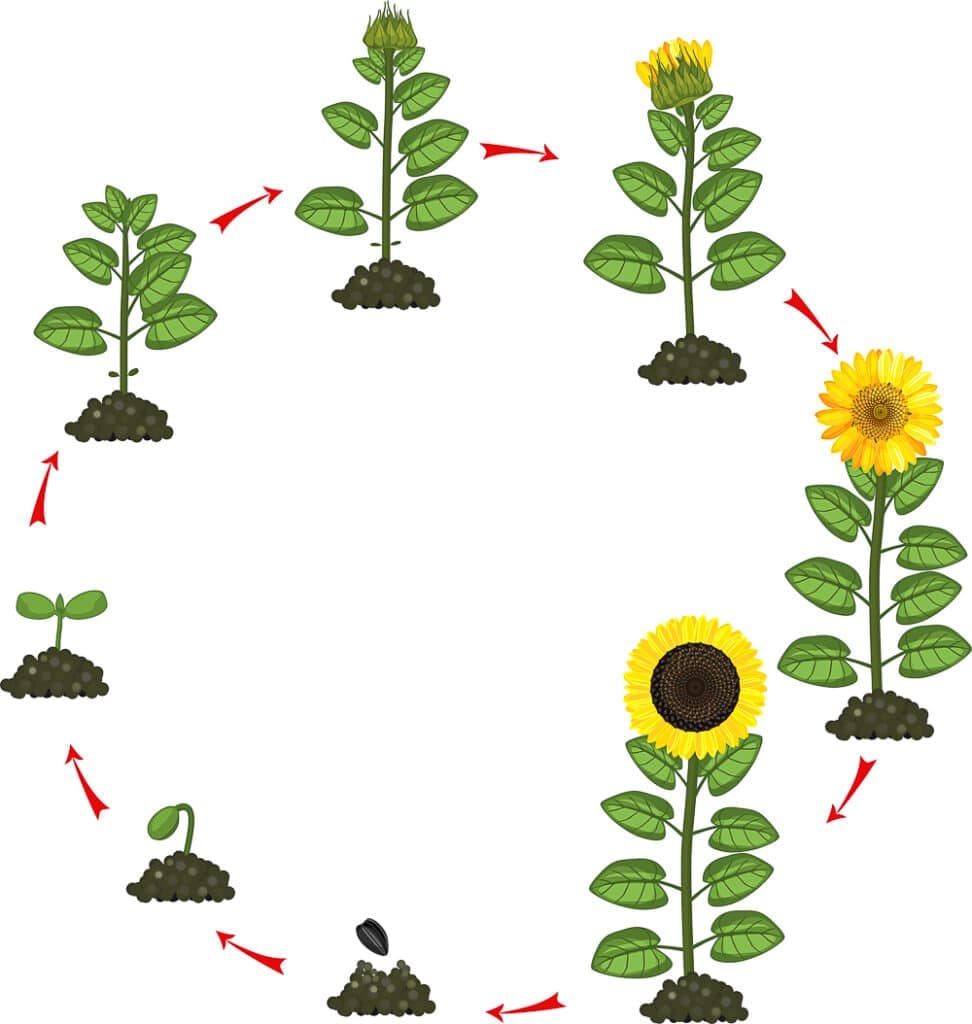How Long Do Sunflowers Take To Grow?
Have you ever wondered how long it takes for those magnificent sunflowers to grow? The growth time of sunflowers is a captivating process that unfolds before our eyes. From tiny seedlings to towering stalks adorned with vibrant yellow petals, the journey is truly remarkable.
Understanding their growth timeline can help you plan when to plant your sunflower seeds and anticipate the breathtaking sight of matured seed heads. So, if you’re curious how long sunflowers take to reach their full potential, keep reading!

Key Points: How Long Do Sunflowers Take To Grow
- Sunflower Growth Timeline: Involves stages from seed germination to full bloom, with roots, shoots, stem growth, leaves for photosynthesis, and bud production leading to flower heads.
- Growth Duration Factors: Influenced by weather conditions, sunflower variety, and care, with an average growth period of 80 to 120 days from seed to maturity.
- Germination and Blooming: Seeds typically germinate in 7 to 10 days; mature plants usually bloom within 30 to 45 days after reaching maturity, depending on environmental conditions and plant health.
Sunflower life cycle: From seed to blooming beauty
The life cycle of a sunflower comprises distinct stages, from the seed’s germination to the flower’s full bloom.
The seed sprouts roots and shoots and the stem grows stronger and taller. The leaves absorb sunlight for photosynthesis, and the plant produces buds, eventually becoming beautiful flower heads. Bees and other pollinators assist in the pollination process.
Finally, the sunflower reaches its full bloom stage with vibrant petals surrounding a prominent disc. Each stage is crucial for the plant’s overall growth and vitality.
- Learn More: Learn about the growth cycle of sunflowers with our detailed guide.

How long does it take for sunflowers to grow from seed?
Growing sunflowers from seed can be an exciting and rewarding experience. However, the time it takes for sunflowers to grow can vary depending on several factors. Let’s explore how long it typically takes for these vibrant flowers to reach maturity.
Factors that affect growth duration
Various unpredictable factors can influence the time it takes for sunflowers to grow from seed:
- Weather conditions: Sunflowers thrive in warm and sunny weather. Adequate sunlight, moderate temperatures, and consistent watering can promote faster growth.
- Sunflower variety: Different varieties of sunflowers have varying growth rates. Some may take a shorter time to mature, while others may require more days before reaching their full potential.

Average growth duration
It takes approximately 80 to 120 days for a sunflower plant to reach maturity from when the seed is planted. During this period, the plant goes through different stages of development, starting as a tiny sprout and eventually growing into a tall and majestic flower.
Patience is key
While waiting for your sunflowers to grow, it’s essential to exercise patience. Remember that each plant has its timeline, influenced by weather conditions and genetics. Be sure to provide proper care by watering regularly and ensuring they receive adequate sunlight.

Germination Time for Sunflower Seeds
Sunflower seeds are a popular choice for planting in gardens and yards. Let’s discuss germination if you wonder how long sunflowers can grow from seed.
Sunflower Seeds Germination Time
When you plant sunflower seeds, they typically take about 7 to 10 days to germinate. During this time, the seeds start sprouting and developing into young plants. It’s an exciting phase as you eagerly wait for those tiny green shoots to emerge from the soil.
Factors Affecting Germination
For successful germination, sunflower seeds require adequate moisture and warmth. When planting the seeds, ensure the soil is moist but not overly saturated. You can also soak the seeds overnight before sowing them to help speed up germination.

Sunflower Blooming Time: When Can You Expect Those Vibrant Flowers?
After patiently waiting for your sunflower seeds to germinate and grow, it’s finally time to talk about when those beautiful flowers will bloom. The blooming period of sunflowers can vary depending on a few factors, but let’s dive in and find out more!
After reaching maturity, sunflowers usually bloom within 30 to 45 days.
Once your sunflower plants have reached maturity, you can expect them to start blooming within a window of 30 to 45 days. This means that from the time the plant has fully grown and developed its leaves and stem, it won’t be too long before you witness the emergence of those vibrant and cheerful flowers.

The blooming period may vary based on environmental conditions and individual plant health.
It’s important to note that the exact blooming period of sunflowers may differ based on various factors, such as environmental conditions and the overall health of each plant.
Factors like sunlight exposure, temperature, soil quality, and water availability can all impact how quickly or slowly your sunflowers bloom. So ensure adequate sunlight, water them regularly, and ensure they’re planted in nutrient-rich soil for optimal growth.
Caring for Young Sunflower Plants To Keep Those Blooms Coming
Once your sunflower seeds have sprouted, providing proper care and attention is essential to help them thrive. Here are some tips:
- Water: Keep the soil consistently moist but avoid overwatering.
- Sunlight: Sunflowers need full sunlight, so make sure they receive at least six hours of direct sunlight each day.
- Fertilizer: Use a balanced fertilizer or compost to provide essential nutrients for healthy growth.
- Support: As sunflowers grow taller, consider staking or providing support to prevent them from toppling over.
With these simple steps, you can ensure that your sunflowers grow strong and vibrant. Enjoy the journey as you watch these beautiful flowers reach their full potential! See our complete guide on care for growing sunflowers.

Learn More About Growing Sunflowers
We have many guides to help you grow magnificent sunflowers in your backyard, with articles to help you know when to plant, fertilize, and harvest.
- Ultimate Guide to Fertilizing Sunflowers
- Dwarf Sunflowers: Big Impact In a Small Package
- How to Harvest Sunflower Seeds
- How Late Can You Plant Sunflower Seeds?
- When to Plant Sunflowers
- Growing Microgreens Indoors (sunflowers make WONDERFUL microgreens! Check it out!)
- How to Grow the Tallest Sunflowers
- Growing Sunflowers in Pots
check out all our sunflower flower posts
Check out our category page with everything you need to know to grow healthy and vibrant sunflowers.
Summary: Sunflowers Might Be The Most Rewarding Flower to Grow
Growing sunflowers is an enriching experience, especially when you finally see those vibrant flowers in full bloom. Their bright yellow petals stretching towards the sky bring joy and happiness to any garden or outdoor space.
So watch for signs of maturity in your sunflower plants, give them proper care and attention, and get ready to enjoy the breathtaking beauty of their blooming season!

FAQs about growing sunflowers:
How often should I water my sunflower seeds?
To ensure that your sunflower seeds germinate and grow correctly, keep them watered. Wet them gently but consistently every 2-3 days until they start sprouting. After establishing themselves, you should water them deeply once a week or whenever the top inch of soil feels dry.
Do sunflowers need full sunlight?
Yes! Sunflowers are aptly named because they thrive in full sunlight. They require at least 6-8 hours of daylight daily to grow tall and produce vibrant blooms. Choose a sunny spot in your garden or yard when planting sunflower seeds.
Can I grow sunflowers in pots or containers?
Absolutely! While most sunflowers are known for their towering height, there are dwarf varieties that are perfect for container gardening. Look for compact sunflower varieties that grow to a manageable size and have sturdy stems. Just make sure your pots or containers have good drainage to prevent waterlogging.
How do I protect my sunflowers from pests?
Sunflowers can attract various pests like aphids, slugs, and birds. You can use organic pest control methods such as spraying neem oil or soapy water to protect the affected areas. You can also cover your young plants with netting to keep birds away.
Can I save sunflower seeds for planting next year?
Absolutely! Saving sunflower seeds is cost-effective and allows you to continue growing these beautiful flowers year after year. Simply let the flower heads dry on the stalks until the back of the head turns brown and the seeds become loose. Then, carefully remove the seeds and store them in a cool, dry place until you’re ready to plant them again next season.




